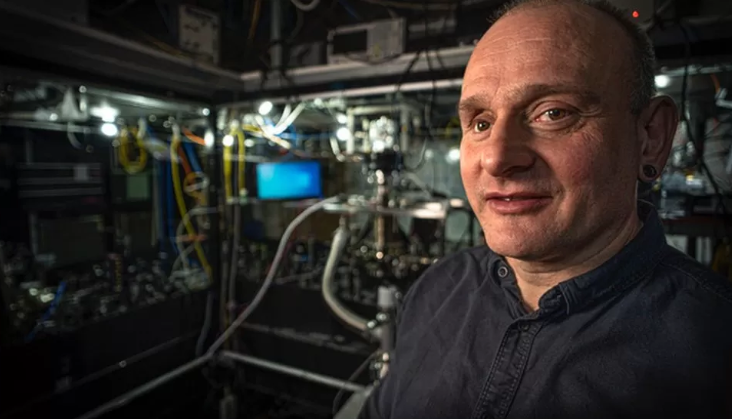(BBC News) Scientists have come a step closer to making multi-tasking “quantum” computers far more powerful than today’s most advanced supercomputers.
Quantum computers make use of the qualities of sub-atomic particles.
So-called quantum particles can be in two places at the same time and strangely connected even though they are millions of kilometres apart.
A Sussex University team has transferred quantum information between computer chips at record speeds and accuracy.
Computer scientists have been trying to make an effective quantum computer for more than 20 years. Firms such as Google, IBM, and Microsoft have developed simple machines. But, according to professor Winfried Hensinger, who led the research at Sussex University, the new development paves the way for systems that can solve complex real-world problems that the best computers we have today are incapable of.
“Right now we have quantum computers with very simple microchips,” he said. “What we have achieved here is the ability to realize extremely powerful quantum computers capable of solving some of the most important problems for industries and society.”
Currently, computers solve problems in a simple linear way, one calculation at a time.
In the quantum realm, particles can be in two places at the same time and researchers want to harness this property to develop computers that can do multiple calculations at the same time.
One stumbling block has been the need to transfer quantum information between chips quickly and reliably: the information degrades, and errors are introduced.
Hensinger’s team has made a breakthrough, published in the journal Nature Communications, which may have overcome that obstacle.
The team developed a system able to transport information from one chip to another with a reliability of 99.999993% at record speeds. That, say the researchers, shows that in principle chips could be slotted together to make a more powerful quantum computer.
Professor Michael Cuthbert, director of the newly established National Quantum Computing Centre in Didcot, Oxfordshire, described the development as a “really important enabling step.” But more work is needed to develop practical systems, he said.
“To build the type of quantum computer you need in the future, you start off by connecting chips that are the size of your thumbnail until you get something the size of a dinner plate. The Sussex group has shown you can have the stability and speed for that step.
“But then you need a mechanism to connect these dinner plates together to scale up a machine, potentially as large as a football pitch, in order to carry out realistic and useful computations, and the technology for communications for that scale is not yet available.”
PhD student Sahra Kulmiya, who carried out the Sussex experiment, says that the team is ready for the challenge to take the technology to the next level.
“It is not just solely a physics problem anymore,” she told BBC News. “It is an engineering problem, a computer science problem, and also a mathematical problem.
“It is really difficult to say how close we are to the realization of quantum computing, but I’m optimistic in how it can become relevant to us in our everyday lives.”
One of the U.K.’s leading engineering firms, Rolls Royce, is also optimistic about the technology. It is working with the Sussex researchers to develop machines that could help them design better jet engines.
Powerful supercomputers are used to model the flow of air in simulations to test out new designs of aircraft engines.
A quantum computer could in principle track the airflow with even greater accuracy, and do so really quickly, according to professor Leigh Lapworth, who is leading the development of quantum computing for Rolls-Royce.
“Quantum computers would be able to do calculations that we can’t currently do, and others that would take many months or years. The potential of doing those in days would just transform our design systems and lead to even better engines.”
Hensinger said he first had the idea of developing a quantum computer more than 20 years ago.
“People rolled their eyes and said: ‘it’s impossible.’ “
“And when people tell me something can’t be done, I just love to try. So I have spent the past 20 years removing the barriers one by one to a point where one can now really build a practical quantum computer.”
https://www.bbc.com/news/science-environment-64492456


